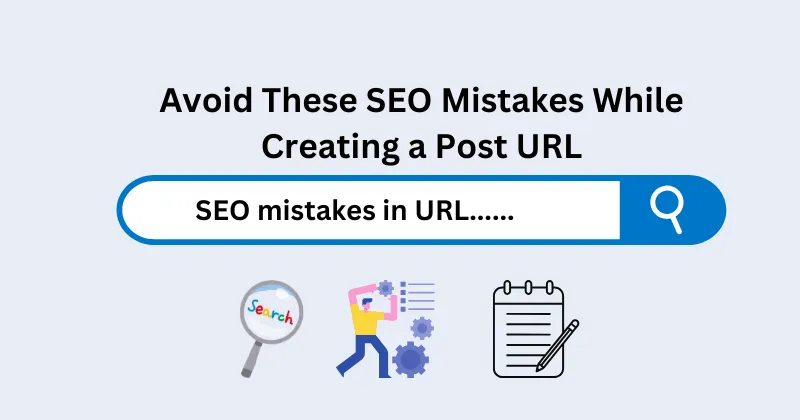Creating SEO-friendly URLs is an often-overlooked part of search engine optimization, yet it’s essential for driving traffic and improving search engine rankings. A perfectly optimized URL provides a path for search engines and users alike, boosting both usability and SEO. Here’s a comprehensive guide on the common mistakes to avoid when crafting URLs for your blog or website.
What are SEO friendly urls
An SEO-friendly URL is a web address designed to be easily understood by both search engines and users, helping improve a webpage’s visibility and ranking on search engines like Google. These URLs are clean, concise, and typically include relevant keywords that describe the content of the page. Unlike long, cluttered URLs with random characters or numbers, SEO-friendly URLs are simple and descriptive, making them more clickable and easier to remember. By aligning with SEO best practices, these URLs not only enhance user experience but also signal search engines about the page’s topic, boosting its discoverability in search results.
Why a Well-Optimized URL is Important for SEO
Your URL structure acts as a roadmap for both search engines and users. A clean, descriptive URL not only helps search engines understand the content but also encourages users to click through. Here’s why you should take time to perfect your URL:
- Improved Rankings: URLs are a minor ranking factor. An optimized URL that includes relevant keywords can contribute to higher visibility in search engines.
- Better User Experience: Descriptive URLs make it easier for users to understand the page content at a glance.
- Increased Click-Through Rate (CTR): A clean, attractive URL can encourage users to click on your link in search results, improving CTR.
Avoiding Stop Words
Stop words, like “a,” “an,” “the,” “of,” “in,” and “to,” are common words that don’t add SEO value. While they make sense in spoken or written language, they add clutter to URLs and don’t help search engines understand your content better.
Example:
- Bad URL: www.example.com/the-best-tools-in-seo
- Good URL: www.example.com/best-seo-tools
Removing stop words keeps URLs clean and focused on the primary keywords. However, a stop word might be essential for clarity in rare cases; use it only if it significantly improves readability.
Avoiding Dates in URLs
While dates can be helpful for news sites or time-sensitive content, they generally aren’t recommended for URLs of evergreen content. Remove dates from URLs to maintain evergreen appeal and prevent content from appearing outdated. This can decrease CTR and impact SEO negatively.
Example:
- Bad URL: www.example.com/2023-seo-trends
- Good URL: www.example.com/seo-trends
By omitting dates, you allow yourself the flexibility to update and repurpose content without making the URL look obsolete.
Skipping Special Characters and Symbols
Symbols like “&,” “%,” “$,” “!,” and “?” should be avoided in URLs because they can cause issues with readability, indexing, and sharing. Special characters can confuse both search engines and users.
Example:
- Bad URL: www.example.com/top-10-seo-tips-&-tricks!
- Good URL: www.example.com/top-seo-tips
Keep URLs simple: use only letters, numbers, and hyphens to ensure readability and searchability.
Minimizing the Use of Numbers
Using numbers in URLs can be problematic if the content might change or be updated. For instance, if your article “10 SEO Tips” is updated to “12 SEO Tips” in the future, the URL will no longer match the content if it includes a number.
Example:
- Bad URL: www.example.com/10-best-seo-tips
- Good URL: www.example.com/best-seo-tips
However, if a number is essential to the content (like “5 Ways to Boost SEO”), it can be included, but only when the number is unlikely to change.
Avoiding Keyword Stuffing and Redundancy
Including your focus keyword in the URL is a good SEO practice, but keyword stuffing can make URLs appear spammy. Repeating keywords in the URL provides no added SEO benefit and makes URLs look cluttered.
Example:
- Bad URL: www.example.com/seo-tips-seo-optimization
- Good URL: www.example.com/seo-tips
Stick to a single use of your primary keyword, and avoid filler words or phrases that don’t add value.
Leaving Out Category and Tag Words (Unless Relevant)
Including unnecessary categories or tags in URLs can make them longer and reduce clarity. Words like “category” or “tag” are redundant and don’t provide context. Focus instead on descriptive keywords that accurately reflect the content.
Example:
- Bad URL: www.example.com/category/seo/best-seo-tips
- Good URL: www.example.com/best-seo-tips
Avoid category and tag words unless they add substantial meaning to the URL.
Avoiding Dynamic Parameters
Dynamic URLs containing query strings like “?id=123” or “?ref=source” make URLs messy, hard to read, and difficult for search engines to crawl effectively. Instead, use clean, static URLs.
Example:
- Bad URL: www.example.com/post?id=123
- Good URL: www.example.com/seo-tips
Static URLs are easier for search engines to index, leading to better visibility in search results.
Keeping Non-Descriptive Words Out of URLs
Words like “blog,” “post,” or “article” rarely add value to a URL. Instead, focus on words that describe the content more specifically and effectively.
Example:
- Bad URL: www.example.com/blog/how-to-improve-seo
- Good URL: www.example.com/improve-seo
URLs should get straight to the point, offering a brief and accurate preview of the content.
Making URLs Short and Concise
SEO best practices suggest keeping URLs under 60 characters. Shorter URLs are easier to read, remember, and share. Try to limit URLs to a few descriptive words that convey the main topic of the content.
Example:
- Bad URL: www.example.com/how-to-improve-your-seo-techniques-with-effective-tips
- Good URL: www.example.com/improve-seo-tips
When crafting URLs, focus on conciseness without sacrificing clarity.
Conclusion: Crafting the Perfect SEO-Friendly URL
Creating an SEO-friendly URL is about more than just adding keywords; it’s about balance, readability, and user experience. A well-crafted URL tells search engines and users what to expect, encouraging both to engage with your content.
By avoiding stop words, dates, special characters, redundant keywords, non-descriptive words, and dynamic parameters, you can create URLs that are both clean and optimized for search engines. Keep URLs short, concise, and relevant, and your SEO strategy will benefit from a clearer, user-friendly path to your content.
FAQs
Is it necessary to include keywords in URLs ?
Yes, including a primary keyword in the URL can help improve SEO, as it provides search engines with an indication of the content’s relevance.
Should I remove all stop words from URLs ?
While stop words generally add little SEO value, they can sometimes be necessary for readability. Remove them if they don’t add clarity to the URL.
What’s the ideal length for an SEO-friendly URL ?
Aim to keep URLs under 60 characters if possible. Shorter URLs are easier to read and perform better in search engines.
Can I use numbers in URLs ?
You can, but avoid numbers that could change over time. Use numbers only if they’re essential to the content, like “5-best-seo-tips.”
Are special characters allowed in URLs?
It’s best to avoid special characters in URLs. Stick with letters, numbers, and hyphens for a cleaner, more user-friendly URL.
With these tips, you’re equipped to create clear, SEO-friendly URLs that will improve both search engine visibility and user experience on your website.

